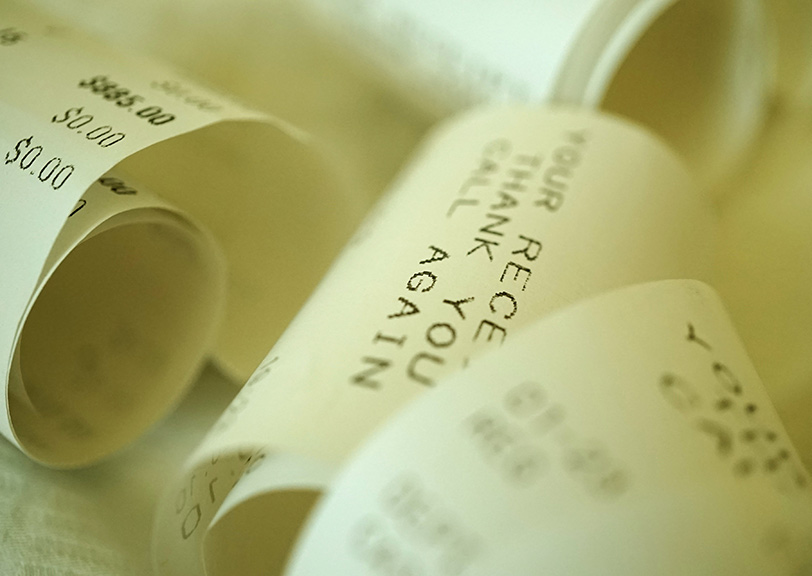ENTER YOUR EMAIL TO RECEIVE OUR WEEKLY NEWSLETTER
“The Next Big Thing” Is About to Hit Town
The Prototype Festival, with its sometimes subversive, convention-defying, mold-breaking theater
By Grace Lichtenstein
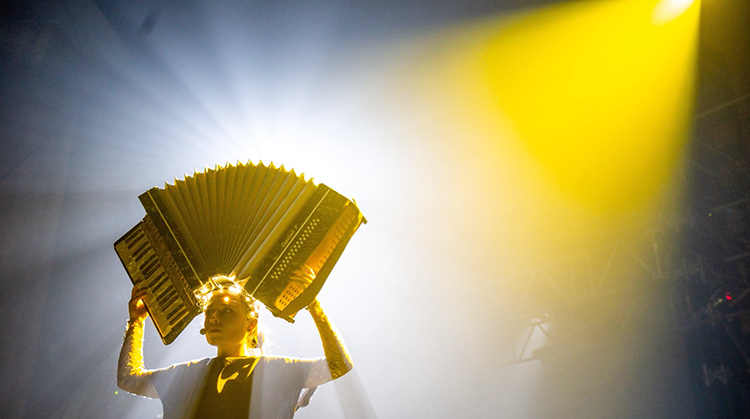
Upwards: A scene from the futuristic Ukrainian opera Chernobyldorf.
. . . . . . . . . . . . .
January 5, 2024
True to its name, the Prototype Festival—running this year from January 10–21 at a variety of downtown Manhattan and Brooklyn venues–has become a model of adventurous arts programming over the course of its 11 seasons. Co-produced by the future-oriented Beth Morrison Projects, an opera- and music-theater company, and HERE, the SoHo theater space, it showcases contemporary opera and music-theater for audiences willing to hear brand new works by unfamiliar creators, including many by women. I love the Metropolitan Opera, yet I look forward every January to Prototype—small in scale but mighty in influence.
Two of its operas, both composed by women, Ellen Reid and Du Yun, have won the Pulitzer Prize for Music. Critical successes have included Breaking the Waves, by Missy Mazzoli, and Dog Days, by David T. Little, both of whom are new-opera stars. 4.48 Psychosis, by Philip Vables and Sarah Kane, is “one of the most original and gripping music-theater pieces of the 21st century,” in the words of the NYCitywoman contributor Ian Strasfogel, himself an opera director.
Critics applaud the Prototype concept, even if some individual works miss their mark. The shows “subversively tweak the parameters” [of music theater], gathering up what might be considered the fringes and pulling them toward the center,” wrote an admiring Washington Post reviewer.
“There is no better place to discover the next big thing in opera,” WQXR proclaimed. A look at this season reveals just how expansive Prototype’s vision of “Opera/Theatre/Now” is.
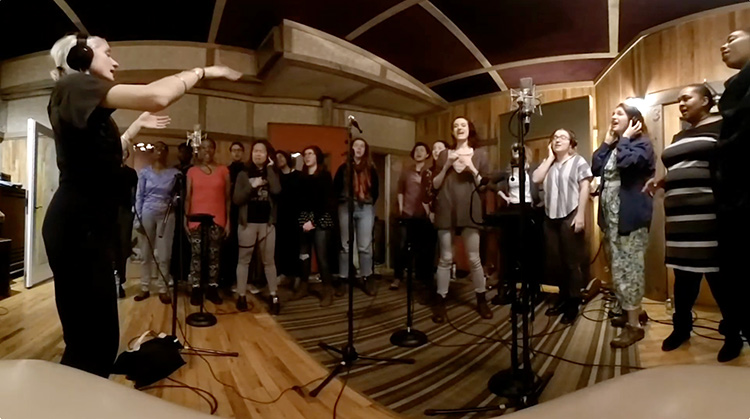
Classical structure … contemporary sound: Heather Christian rehearsing her first breviary mass, Prime.
. . . . . . . . . . . . .
First up: Terce: A Practical Breviary, an oratorio by the Obie Award–winning composer, librettist and singer Heather Christian. It’s a canonical mass, but don’t expect a sober church service. Instead, this is a radically female take on the traditional monastic mass, featuring the composer’s signature bluesy, gospel-tinged sound. It is sung and danced by a choir of 30 mostly nonprofessional women, ranging in age from 21 to 82.
For Christian, the breviary hours are “an ancient, elegant” way of asking “unanswered questions.” She interprets Terce, the canonical hour of 9 a.m., as “meditation on the divine feminine through the lens of the Holy Spirit,” with “women’s wildness” at its heart. The choir is accompanied by keyboard, guitars, flute, violin, cello, saxophones, and a customized drum kit that a percussionist made from household objects. “I’m stuffing the classical structures full of contemporary sound,” Christian said by phone. The dancing is “sort of uncorked;” she recruited her mother, who was a ’60s-era go-go dancer in New Orleans, to help with the choreography.
Christian’s first breviary Mass, Prime (the hour of sunrise), debuted during the pandemic as a podcast. Terce is more like a vocal “pancake breakfast,” with people “coming together before they start their day’s work.” She hopes that women in the audience will “feel like they’ve released something,” that men will “feel like they’ve learned something,” and that everyone will absorb her vision of female holiness. No wonder the critic Ben Brantley, reviewing an earlier work, called Christian an artist of “blazing creative ambition.”
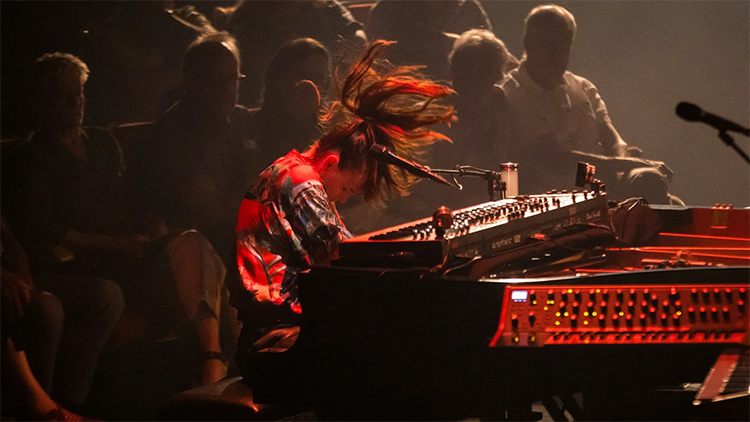
“Magnetic”: The Dutch singer-songwriter Wende busy at the keyboard, her hairdo asunder.
. . . . . . . . . . . . .
The Promise, a song cycle performed by Wende, a Dutch singer-songwriter acclaimed in Europe, is also women-centric. It originated in 2019 in London, where Wende collaborated with British artists at the Royal Court Theatre to develop songs about loneliness, birth, childlessness, perfect mothers, aging, and the like. At this year’s Prototype Festival, the singer will be making only her second appearance in the U.S. On her first visit, eight years ago, she performed Schubert’s classical song cycle Winterreise at National Sawdust, a performing arts center in Brooklyn.
Speaking from the Netherlands, Wende explained she had been “looking for miniature stories” when she teamed up with the designer Chloe Lamford and the the composer Isobel Waller-Bridge, along with the playwrights E. V. Crowe, Sabrina Mahfouz, Somalia Nonyé, Stef Smith, and Debris Stevenson. Wende asked them,“What if we don’t have a play, but a song—how would courage sound to you? How would a curse sound?” The project now called The Promise was the result.
In London, the show got stellar reviews. The Guardian praised Wende as “magnetic, her voice a runaway, swirling, heady thing that feels as if it could take flight.” “Courageous concepts are handled with warmth and sophistication …. Fleabag meets Lady Gaga.” raved Broadway World.
It wouldn’t fit Prototype if the song cycle didn’t have an edge. “We have rituals for birth, for funerals, for marriages. I want a ritual for a woman who doesn’t want to have a kid,” Wende said. The upshot was a song that got a huge response. “Women thanked me for singing it,” Wende said. “They felt validated.”
She recited the bridge of another song:
I ask my mother
What kind of mother she imagined she would be
She said she thought she’d be a motherfucker
A real motherfucker
But that’ll change when she had me.
In New York, as at the Royal Court, Wende will have her audience sing along with her.
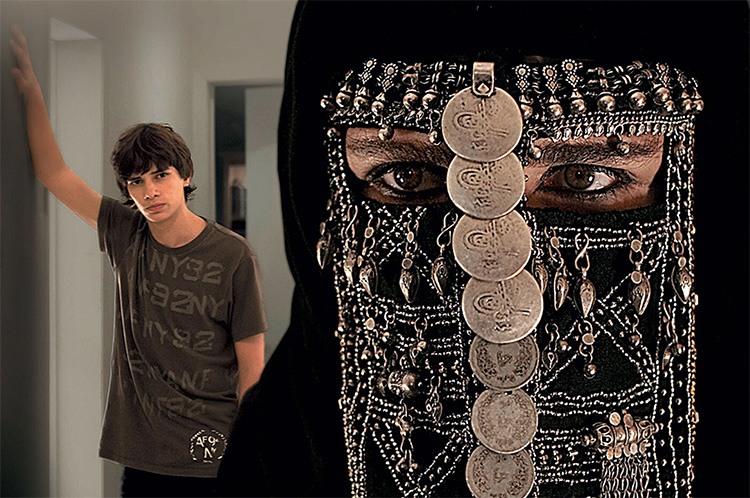
Eyes alert: A scene from the Atom Egoyan film “Adoration,” which inspired Mary Kouyoumdian’s opera of the same name.
. . . . . . . . . . . . .
Among Prototype’s 2024 world premieres is Adoration, an opera for six singers, recorded soundscape, and string quartet by Mary Kouyoumdjian, with a libretto by the prolific Royce Vavrek. Focused on racism, hate, and reverberations from a historic terrorist attack, it’s in keeping with the festival’s recurring themes.
The opera is based on Atom Egoyan’s 2008 film of the same name, which in turn was inspired by a true story about a plane flight from London to Israel. The narrative touches on the city of Bethlehem, so it arrives with a timeliness the composer did not intend; she began working on the opera in 2016.
Both Kouyoumdjian and Egoyan are of Armenian heritage. By phone, Kouyoumdjian pointed out that the story never states the ethnicity of the characters: the opera “doesn’t take sides.” Still, the current war in the Middle East reveals how timeless the centuries-old subject is.
Kouyoumdjian has used the civil war in Lebanon and the 1915 genocide in Armenia in other works, too. Generations of her family fled from both countries. Although she was born in the U.S., she is that rarity among American composers—one whose music is politically charged. If you deal with “uncomfortable subjects, you cannot leave people feeling comfortable,” she said. “My work is not polite.” When the Kronos Quartet performed her composition Bombs of Beirut, which includes tape recordings of actual bombings there, “the discomfort was a little too much”; some audience members in Europe walked out.
The 2024 lineup also includes Angel Island, an opera about incarcerated Chinese immigrants, by the Chinese-American composer Huang Ruo; Chornobyldorf, a futuristic Ukrainian opera by Roman Grygoriv and Illia Razumeiko; and a piece to be staged outdoors by the indigenous composers Autumn Chacon and Laura Ortman. Also on the agenda: three digital streams guest-curated by Du Yun.
Grace Lichtenstein is a former New York Times reporter and bureau chief, the author of six books and a contributor to numerous national magazines.
You may enjoy other NYCitywoman articles by Grace Lichtenstein:




